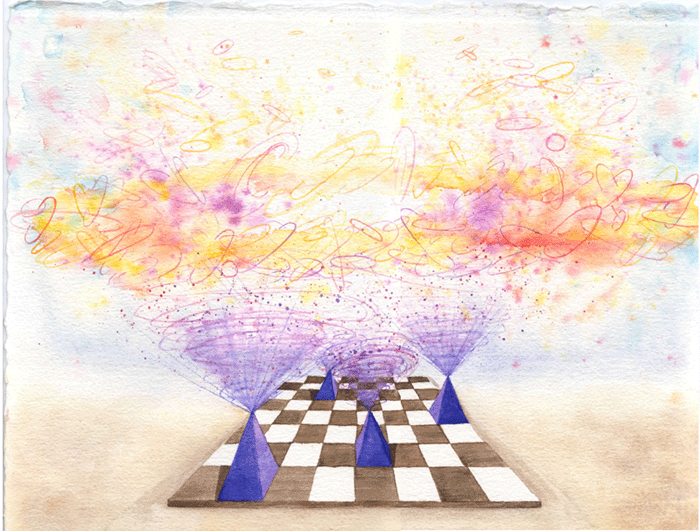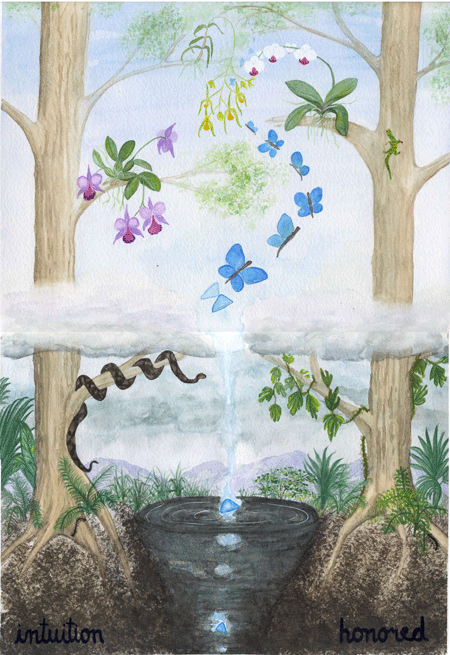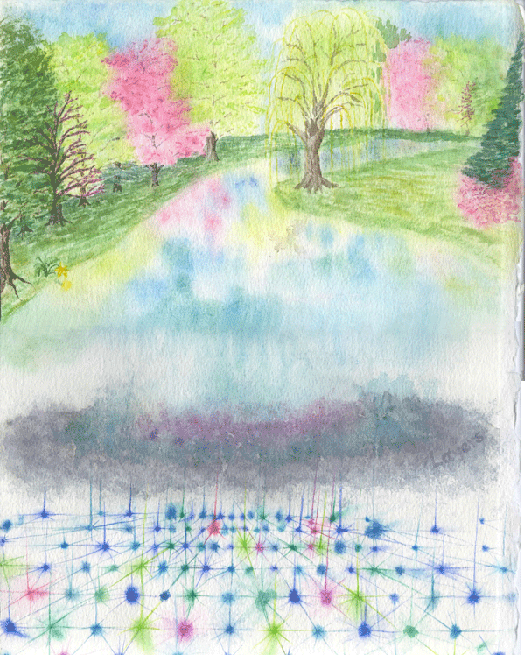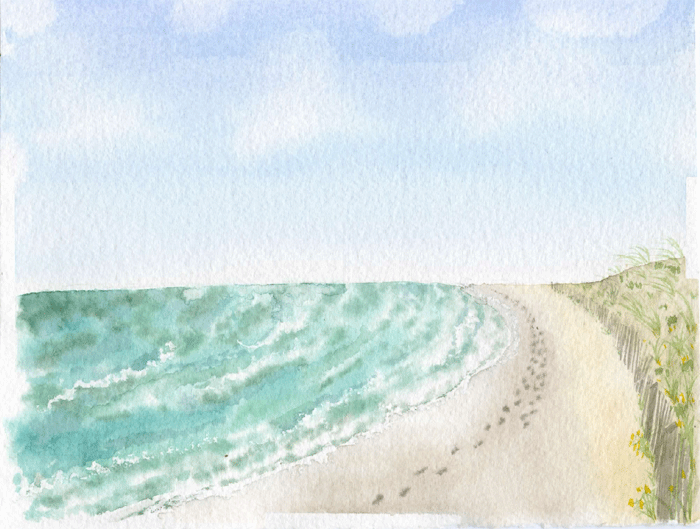
College Seminar I
Bryn Mawr College
Fall 2002
Questions, Intuitions, Revisions:
Telling and Re-Telling Stories About Ourselves In the World
Anne Dalke (English House, ext. 5308, adalke@brynmawr.edu)
Paul Grobstein (Park, ext. 5098, pgrobste@brynmawr.edu)
Hayley Thomas (Taylor, ext. 5369, hthomas@brynmawr.edu)

Out beyond ideas of wrongdoing and rightdoing,
there is a field. I’ll meet you there.
Jallaludin Rumi
http://www.khamush.com/life.html
All images in this syllabus were created by Sharon
Burgmayer,
Department of Chemistry, Bryn Mawr College. For an exhibit of her
work see
http://serendipstudio.org/sci_cult/bridges/transformation/metamorphosistop.html
This course was co-designed by teachers of Biology, English and Folklore to explore the variety of ways in which we are all continually reaching for new understandings. Materials to be handled in the class include fairy tales, the nineteenth-century satire Flatland, Bertold Brecht’s play The Life of Galileo, Octavia Butler’s novel Parable of the Sower and reflections on topics ranging from linguistics and neurobiology to the culture of Bryn Mawr. In addition to long-established elements of inquiry--acting, enacting, observing, experimenting, reading, talking and writing--we will explore visual culture, the new potentials of the web and other aspects of developing information technology. Together, we will apprehend this wide range of literary, cultural and scientific stories, intuiting, imagining and revising what they might mean, continuously telling and re-telling them in an attempt to "get it less wrong."

I. Reading and writing ourselves
"The stories we tell ourselves, particularly the silent or
barely audible
ones,
are very powerful. They become invisible enclosures. Rooms with no air.
One must open the window to see further, the door to possibility….
How to tell a story without fashioning it along the prefabricated lines? . .
. .
we are immersed in an old story and cannot see what is happening."
Susan Griffin, A Chorus of Stones: The Private Life of War.
New York: Anchor, 1992. 284, 324.
"I wrote the story first. It was a true story. But it
seemed too simple.
So then I wrote the counter narrative: a second voice, second
thoughts."
Griffin, Reading at Bryn Mawr. February 2, 1999.
Week One
(one of our sections meet MW, two on TTh, hence the double
dates….)
9/2-3
Introduction to the course
Reading an image
9/4-5
Chapman, Tracy. "Telling Stories."
Tuan, Yi-Fu. "A Life of Learning." Charles Homer Haskins
Lecture for
1998. American Council of Learned Societies Occasional
Paper, #42.
Bateson, Mary Catherine, Composing a Life, New York:
Atlantic Monthly
Press, 1989. 1-34, 232-241.
Hempl, Patricia. "Memory and Imagination." I Could
Tell You Stories.
New York: Norton, 1999. 21-37.
Week Two
9/9-10
Selected excerpts by Charles Darwin, Soren Kierkegaard &
Virginia Woolf
from Nothing Begins with N: New Investigations of
Freewriting.
Ed. Pat Belanoff, Peter Elbow and Sheryl I. Fontaine.
Carbondale:
Southern Illinois University Press, 1991.
Large group writing workshop
Draft A, 4-5pp: compose your own life
of learning
9/11-12
Grimm, Jakob and Wilhelm. "Little Briar Rose" and
"Cinderella."
The Complete Grimm’s Fairy Tales. Trans. Margaret
Hunt. Revised James Stern. New York: Pantheon, 1972. 118-122,
64-71.
"Words Without End." Afro-American Folktales: Stories From the Black
Tradition in the New World. Ed. Roger Abrahams. New York :
Pantheon, 1985.
"Nourie Hadig." The Old Wives' Fairy Tale Book. Ed.
Angela Carter.
1990.
"Crawling into the Elephant's Belly."
"Yeh-Shen." Myths, Legends and Folktales of America.
Ed. David Leeming
and Jack Page. New York : Oxford University Press, 1999.
Week Three
9/16-17
Small group writing workshops
Draft B, 4-5 pp: write a fairy tale
(maybe re-compose your life as a fairy tale?)
9/18-19
Sexton, Anne. Transformations. Boston: Houghton
Mifflin, 1971.
Smith, Mary Carter. "Cindy Ellie, A Modern Fairy Tale."
Talk That
Talk: An Anthology of African-American Storytelling. Eds.
Linda Boss and Marian F. Barnes. New York: Simon
and Schuster/Touchstone,
1989. 396-402.
Week Four
9/23-4
Large group writing workshop
Draft C, 4-5 pp: revise your life of learning and/or fairy tale
9/25-26
Bettelheim, Bruno. "Reflections: The Uses of
Enchantment." The
New Yorker (December 8, 1975): 50-114.
Sunday evening, 9/29: Conference on fairy tales

II.Ordering and Re-ordering the World
"Physical concepts are
free creations
of the human mind,
and are not, however it may seem,
uniquely determined by the external world."
Albert Einstein, in Albert Einstein and Leopold Infeld.
The Evolution of Physics. New York: Simon and Schuster,
1938. 33.
Week Five
9/30-10/1
Rodriguez, Juana. Guidelines for Revisions.
Small group writing workshops
Paper #1: using Bettelheim’s methodology
(or another), analyze your fairy tale. Submit both together for evaluation.
10/2-3
They Might be Giants. "Particle Man."
Abbott, Edwin. Flatland: A Romance of Many Dimensions. 1885;
rpt. New
York: New American Library, 1984.
Monastersky, Richard. "Recyling the Universe: New Theory
Postis that Time
Has No Beginning or End." The Chronicle of Higher
Education.
June 7, 2002. Foucault, Michel. Preface and Forward. The Order of Things:
An Archaeology of the Human Sciences. 1966;
rpt. and trans.
New York: Vintage, 1973. ix-xxiv.
Week Six
10/7-8
Large group writing workshops
Draft A: drawing on Foucault and Flatland,
reflect on our class website about on why we are both motivated and reluctant
to re-tell stories. What provokes us to this activity? What prevents us from
engaging in it? How does it profit us, and what are its costs?
10/9-10
Brecht, Bertolt. Galileo. 1952; rpt. New York: Grove, 1966.
10/15-10/17 FALL BREAK
Week Seven
10/21-22
Galileo, continued….
http://www.nap.edu/html/creationism/index.html
http://www.creationism.org http://emporium.turnpike.net/C/cs
http://www.scientificcreationism.org http://www.nytimes.com/2001/04/08/science/08DESI.htmlsearchpv=site08
http://slate.msn.com/Earthling/01-04-16/Earthling.asp
http://www.natcenscied.org
http://www.discovery.org/crsc/index.php3
Small group writing workshops
Paper #2: Visit the various websites
on evolution and creationism; on our class website, answer
last week’s
questions again, focusing this time on the contemporary debate about
science education.
III. Telling and Re-telling Culture’s Story
All that you touch
You Change.
All that you Change
Changes you.
The only lasting truth
Is Change.
God
Is Change.
Earthseed: The Books of the Living
Parable of the Sower, Octavia Butler
10/23-24
Silko, Leslie Marmon. "Language and Literature from a Pueblo Indian
Perspective." Critical Fictions, ed.
Philomena Mariani.
Seattle: Bay Press, 1991. 83-93.
Geertz, Clifford. "Deep Play: Notes on the Balinese
Cockfight." The
Interpretation of Cultures: Selected Essays. New York: Basic,
1973. 195-240.
Theophano, Janet. "’I Gave Him
a Cake’:
An Interpretation of Two Italian-American
Weddings." Creative
Ethnicity: Symbols and Strategies ofContemporary
Ethnic Life.
Eds. Stephen Stern and John Allan Cicala. Logan, Utah: Utah State
Universtiy Press, 1991. 44-54.
Week Eight
10/28-29
Large group writing workshop
Draft A: In the course forum area, tell the story of some aspect
of a culture with which you are familiar.
10/30-31
Butler, Octavia. Parable of the Sower. New York: Warner, 1993.
MONDAY 11/4, 7:30 p.m.
OCTAVIA BUTLER READING IN THOMAS GREAT HALL
Week Nine
11/4-5
Butler, continued…
Small group writing workshops
Draft B: In the course forum area, describe your initial reactions
to Butler’s novel. What has the experience of reading the
novel been like
for you? Within the context of this class: what do you find most interesting
& most problematic about the story she tells, and how she tells it?
11/6-7
Butler, continued…
Week Ten
11/11-12
Butler, continued …
Large group writing workshop
Paper #3: Bring to class an expanded version
of your initial thoughts about what is accomplished in Butler’s
telling and re-telling of this story.

IV. Apprehending and Absorbing the Storyteller
"The Brain--is wider than the
Sky--
For--put them side by side--
The one the other will contain
With ease--and You--beside--
The Brain is deeper
than the sea--
For--hold them--Blue to Blue--
The one the other will absorb--
As Sponges--Buckets--do
The Brain is just the
weight of God--
For--Heft them--Pound for Pound--
And they will differ--if they do--
As Syllable from Sound–"
Emily Dickinson. 1896; rpt. The Complete Poems.
Ed. Thomas Johnson. Boston: Little, Brown, 1960.
11/13-14
Polanyi, Michael. The Tacit Dimension. New York: Anchor,
1967. 3-25.
Lakoff, George and Mark Johnson. "Introduction: Who are We?" "The
Cognitive
Unconscious," "The Embodied Mind" and "Primary Metaphor
and Subjective
Experience." Philosophy in the Flesh: The Embodied
Mind and Its
Challenge to Western Thought. New York: Basic Books, 1999.
3-59.
Week Eleven
11/18-19
Small group writing workshops
Draft A: collect data on tacit understanding
11/20-21
Vygotskii, Lev Semenovich. Thought and Language. Trans.
Eugenia Hanfmann
and Gertrude Vakar. Cambridge: M.I.T. Press, 1962. 1-7, 119-153.
Pinker, Steven. "An Instinct to Acquire an Art,"
"Chatterboxes" and "Mentalese."The
Language Instinct. New York: HarperPerennial, 1995. 15-82.
Language: A Conversation. http://serendipstudio.org/local/scisoc/language/
Week Twelve
11/25-26
Large writing group workshop
Draft B: interpret the observations you
have made
11/27-28 THANKSGIVING VACATION
Week Thirteen
12/2-3
Sacks, Oliver. "The Last Hippie" and "A Surgeon’s
Life." An Anthropologist on Mars. New York:
Vintage, 1995. 42-107.
Small group writing workshops
Paper #4: What new questions does your
explanatory theory raise?
What new experiment need you now design, to elicit a further set of
observations?

V. Re-vising and re-visioning Bryn Mawr
"If resistance is always the sign of a counter-story,
ambivalence
is perhaps the state of holding on to more than one story at a
time."
Barbara Johnson, The Feminist Difference: Literature, Psychoanalysis, Race,
and Gender.
Cambridge: Harvard University Press, 1998. 2
12/4-5
Horowitz, Helen. "A Certain Style of ‘Quaker Lady’ Dress"
and "Behold They Are Women!" Alma Mater: Design
and Experience in the Women's Colleges from Their
Nineteenth-Century
Beginnings to the 1930s. New York: Knopf, 1984. 105-133.
The Women of Summer: The Bryn Mawr Summer School for Women
Workers,
1921-1938 (videorecording). Dir. Suzanne Bauman.
New York: Filmakers
Library, 1985. (55 mins.)
Heller, Rita Rubinstein. "An ‘Unnatural’
Institution." "The
Women of Summer: The Bryn Mawr Summer School for Women Workers,
1921-1938." Dss. Rutgers University, 1986. 1-36.
Grumman, Anne. "The Summer School as Seen by a Tutor." Bryn Mawr
Alumnae Bulletin 1, 8 (October 1921). 19-23.
Saunders, Louise Brownell. "Four Weeks’ Experience in the Bryn Mawr
Summer School forLabor." Bryn Mawr Alumnae Bulletin. 1,
9 (November 1921).
13-16.
"The Future of the Summer School." Bryn Mawr
Alumnae Bulletin
1, 9 (November 1921). 17-19.
Smith, Hilda Worthington. "The Summer School of 1924." Bryn Mawr
Alumnae Bulletin 4, 8 (October 1924). 9-11.
-----. "The National Experiment in Adult Education." Bryn Mawr
Alumnae Bulletin 13, 9 (December 1933).
8-10. "Open
Letters About the Summer School." Bryn Mawr Alumnae
Bulletin 15,
5 (May 1935). 4-8.
Week Fourteen
12/9-10
Large group writing workshop
Draft A: write the story of Bryn Mawr,
as you now understand it.
12/11-12
McDermott, Ray and Herve Vareene. "Culture as Disability."
Anthropology and Education Quarterly 26, 3 (1995):
324-348.
Osborne, Lawrence. "Regional Disturbances." The New
York Times.
May 6, 2001.
Small group writing workshops, in which we
re-write our stories
of Bryn Mawr: what disabilities are generated by what we see
being taught
here?
Reading week: Paper #5, to conclude: how might we revise the Bryn Mawr Story? (This might take the form of a fairy tale, or a montage, or a poem; it could also be collaboratively written or performed….)
Sunday evening, 12/15: Final Celebration

Expectations for the Course
Reading Assignments are listed above; you will be expected to read these books and articles thoroughly, and come to class prepared to discuss and write about them. Readings should be completed by the due date in the syllabus. A collection of the excerpts and articles are available for purchase as a packet. Four texts are also available in the Bryn Mawr College Bookshop:
Anne Sexton, Transformations
Edwin Abbott, Flatland
Bertolt Brecht, Galileo
Octavia Butler, Parable of the Sower
Writing Assignments are designed to build on the reading, writing, and thinking skills you bring with you to college and to help you move you beyond them. Assignments explore key issues in the course; they require creative, reflective, critical and analytical work and will ask you to draw on life experiences as well as on assigned readings and class discussions. Writing assignments include bi-monthly web postings in response to the course’s "images"; weekly drafts of papers, due sometimes as web postings, sometimes due in typewritten form in your professor’s mailbox by 9 a.m. each Monday or Tuesday (depending on when your section meets); and the submission of a final portfolio in which you review your semester’s work. Each assignment will be discussed in detail during class over the course of the semester.
Conferences and Class MeetingsIndividual classes will meet regularly twice a week. All members of the seminar are expected to participate actively in class-wide discussions. The quality of our work together rests on our collective commitment to reading and writing, speaking and listening attentively with each other.
We will also hold several cluster-wide gatherings during the course of the semester–stay tuned for details on those events!
Paper Assignment #4
Our sequence of drafts for Paper #4 derives from Michael Polyani’s claim in The Tacit Dimension that
Tacit knowing is shown to account (1) for a valid knowledge of a problem, (2) for the scientist’s capacity to pursue it, guided by [her] sense of approaching its solution, and (3) for a valid anticipation of the yet indeterminate implications of the discovery arrived at in the end. (24)
Each of Polyani’s stages marks a draft in your writing process.
You’ll find "Time to Think" @
http://serendipstudio.org/bb/reaction/
"Seeing More than your Eye Does" @
http://serendipstudio.org/bb/blindspot1.html
and "The Three Doors of Serendip @
http://serendipstudio.org/~pgrobste/ThreeDoors/
Alternatively, you may want to conduct your own experiment, making observations of how you see yourself--or preferably, others--using tacit knowledge; you might also find it very productive to conduct two different experiments/gather two different sets of comparable data in which you have observed tacit knowledge being used.
(2) The week of November 25-26, please deliver to our offices by 9 a.m. a draft in which you interpret the observations you have made: what story, what theory most fruitfully describes the data you have collected? We will conduct a large-group writing workshop on these drafts.
(3) The week of December 2-3, please bring to class a final version of this paper, in which you not only present and interpret your data, but also identify what new questions your explanatory theory raises. What new experiment need you now design, to elicit a further set of observations?
Instructions for Paper #5
(following a pattern which may be wearyingly familiar to you by
now: a sequence
of 3 steps):
1. Read through all the materials in the course packet on Bryn Mawr history: Horowitz's two chapters, Heller's introduction, and the 6 short essays from the 1920s-30s Alumnae Bulletin. We will also watch The Women of Summer video in class early next week. Then during the week of December 9-10, write, and post on our course forum, a short draft of "the history of Bryn Mawr" as you now understand it. In this essay, draw on your own campus experiences as well as your reading and viewing of the assigned materials. What is most striking to you about this slice of Bryn Mawr history? What surprises you, pleases you, distresses you? What would you like to know more about?
2. Read the McDermott and Vareene essay on "Culture as Disability" and the Osborne NYTimes piece. Come to class during the week of December 11-12 with notes and thoughts about ways in which you might re-write your above story of Bryn Mawr, focusing on the disabilities that may be generated by the abilities you see being taught here.
3. In your final draft, revise this Bryn Mawr story a third time. This might take the form of an essay, a futuristic short story, fairy tale, a montage, a poem or an illustration; it could be a riff on Sharon Bergmeyer's production of "Understanding is ???"; it could be collaboratively written or performed at our final celebration on Sunday evening, 12/15.
Instructions for Preparing your Final Portfolio
In this portfolio, due by noon on Saturday, December 22nd, we are asking you to collect and reflect on the written work you have done for this course. This portfolio project invites you to chronicle what has happened in your evolution both as a writer and a speaker in class, and to contribute to and assist us with the evaluation of your work. So--
In our responses to your portfolio, we’ll be giving you a grade not just for the quality of your written work, but also for class participation and process. Your self-evaluation will assist us with our own.
We very much look forward to seeing what you come up with, as well as what you have to say about it.
In gratitude for the pleasure we have found in the hard work we have all been doing together,
Anne, Hayley and Paul
| Forum
| Science in Culture
| Serendip Home |